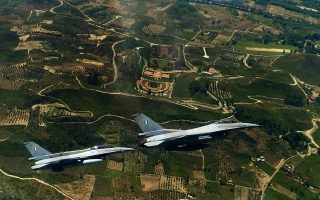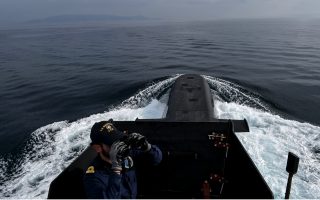The motivations behind Turkey’s behavior

The unprecedented challenge that the deal between Turkey and Fayez al-Sarraj’s Libyan government poses to Greece has resulted in a renewed effort to understand Turkish motivations from three different angles.
The first is the economic approach and sees Turkish actions as an attempt to acquire access to hydrocarbon deposits. Put in simplistic terms, we could sum up this argument as “all wars are about oil,” and it would therefore follow that a distribution of these resources would avert conflict.
The manner in which this conversation is framed in Greece tends to excite fantasies of billions of barrels of oil that would erase the public debt almost overnight. It makes sense, then, for Turkey to want a share of this energy “treasure;” therefore, if we manage to give it a piece of the pie through bilateral negotiations, it will leave us alone.
Champions of this “win-win” approach see it as a negotiable option. This, however, is not the case for two basic reasons:
a) If under the threat of violence you agree to share resources with the person making the threat over something he does not own, then why should he respect the win that was only allowed by his magnanimity? He will use the same blackmailing tactic, at a time of his own choosing, to take your half, the piece you had not ceded to begin with. He will leave you with the illusion of a viable compromise that may buy you some peace of mind for a few years, but ultimately all that he will have left you is the indignity of the person who shoots himself with his own gun when others are threatening to kill him. This is how the Czechoslovakians must have felt a year after the Munich Agreement with Hitler in 1938.
b) The area outlined by Turkish demands along the Greek continental shelf between Kastellorizo, Rhodes and Lasithi on Crete is the most unexplored in terms of seismic research in Europe. There has been no exploratory drilling whatsoever, which makes sense as seismographic data has not been collected for decades there, because no one has considered this area to be of any interest. No one is conspiring to hide something because no one knows what this area could contain in terms of hydrocarbons. Therefore, Turkey’s aggression cannot be explained as being motivated by energy interests when the assets at stake are unknown.
The second approach is centered on the law and has a tendency of treating Turkish aggression like a courtroom simulation. International law forms the cornerstone of Greece’s foreign policy. However, if we do not have the deterrent power to defend it, we cannot protect ourselves just by invoking it for the simple reason that compliance with international law is not automatic.
The fact that the Turkey-Sarraj agreement is invalid, illegal and irrational does not mean that it doesn’t entail the risk of political faits accomplis. These can be averted not just by legal arguments but mainly through our airborne deterrent strength, which would render our legal arguments much more effective. Meanwhile, our powerful alliances may be multiplying, but they are no substitute for either of the two aforementioned factors of national force. The stance of France, Egypt and Israel will be key here.
This law-centric approach calls for immediate recourse to the International Court of Justice at The Hague via an arbitration agreement and the restarting of exploratory talks in order to achieve this arbitration agreement. It fails, though, to answer a series of questions that render this option impractical, such as:
– Why would Turkey accept an arbitration agreement which it has stubbornly refused to sign since 1976, especially when the balance of power is clearly more in its favor than it was in 1976 or 1987?
– Why should exploratory talks lead to an agreement now when they’ve failed to do so for the past 20 years, during which time they were a simulation of negotiations?
– Will we seek a package solution for the Aegean and the Southeastern Mediterranean or will we ask for a decision only on our differences with Turkey in the Southeastern Mediterranean, where, however, we have yet to determine the external boundaries of the Greek continental shelf – which is in fact the basis of our line of negotiation – as we have done in the Ionian and Libyan seas since 2011?
– With which exact measurement of territorial waters will we go to The Hague? Will we try to win Turkey over to the idea of legal recourse by accepting – as the government of Costas Simitis did in 2002-04 – that Greece’s territorial waters are less than 6 nautical miles in parts of the Aegean?
– Could Turkey view the intention to embark on negotiations as a sign of weakness and move ahead with implementing the Sarraj accord by sending seismic research vessels into the disputed area?
The third approach, that of Thucydidean Realism, sees Turkish aggression as stemming from an imbalance in the bilateral balance of power. Observing the actions of Recep Tayyip Erdogan, Thucydides would not recommend that Greece should take immediate recourse to The Hague.
He would note that Libya lies too far away for the Turkish Armed Forces and that Turkey not only has no response to the Greek Mirage jets but has the same type of F-16s as Greece, though manned by inferior crews following the purge in the wake of the 2016 coup attempt. He would remind us that Greece has a superior submarine fleet to that of Turkey, and that these vessels have clear tactical advantages in the Southeastern Mediterranean theater due to the proximity of Greek harbors.
He would advise us to form a common front with Egypt, Saudi Arabia, the United Arab Emirates and the majority of the Arab League states that would recognize a future Libyan government under or including General Khalifa Haftar, with which we would sign our own exclusive economic zone agreement.
Lastly, he would recommend that we deepen the defense and intensify the energy parameters of our cooperation agreements with Cyprus, Egypt and Israel, delineating the external borders of our continental shelf in the Southeastern Mediterranean up to the point where Cyprus’ delineation begins and then – after agreeing on an EEZ delimitation with Egypt – take recourse to The Hague, inviting Turkey to do the same.
* Dr Theodoros Tsakiris is an associate professor of geopolitics at the University of Nicosia.





